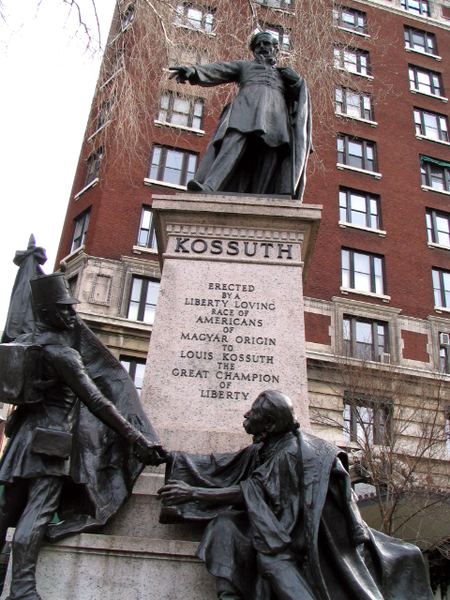Orban in the Footsteps of Kossuth
We’re looking forward to hearing what Prime Minister Orban has to say at CPAC. While we wait, though, we’ve been reading up on Lajos Kossuth. He’s the hero of Hungarian independence and the last of its leaders to cause excitement in America.

We’re looking forward to hearing what Prime Minister Victor Orban of Hungary has to say when on Thursday he delivers his remarks to CPAC’s parley at Dallas. Particularly in the wake of the resignation by one of his key advisers, Zsuzsa Hegedus, to protest remarks by Mr. Orban that, the AP reports, she likened to language used in Nazi Germany. We’re eager to see how Mr. Orban’s ideas prosper among our conservative intelligentsia.
While we wait, though, we’ve been reading up on Lajos Kossuth. He’s the hero of Hungarian independence and the last of its leaders to cause excitement in America. He studied America’s government before his revolt, in 1848, against the Habsburg monarchy. The campaign that followed riveted the world and led briefly to a free Hungary with Kossuth at its head. At Budapest he proclaimed: “From this city the freedom of Europe will radiate.”
It was not to be, though, as the Russian Tsar invaded to reimpose Austrian rule. “Treachery forced him to flee into exile,” the Sun later reported. Kossuth penned an appeal to Americans, whose “sublime example,” he wrote, had inspired Hungary’s uprising: “From your history, as from the star of hope in midnight gloom, we drew our confidence and resolution.” Americans “show the world how to deserve freedom, how to win it, and how to use it.”
When, in 1851, Kossuth visited America, cannons fired to salute his arrival at New York harbor, and he was lauded as the “Hungarian Washington.” Upon disembarking, historian John St. Leger writes, Kossuth asked for books on “Washington, Jefferson, Jackson and other American statesmen.” Our kind of guy. The Sun noted that his visit induced at New York “Kossuth mania.” Restaurants added goulash to their menus.
Kossuth asked at Baltimore how America could be “indifferent” to Europe’s “oppression of civil, political and religious liberties.” Abraham Lincoln heard Kossuth speak at Springfield, Illinois. The pusillanimous pencil pusher at the Tribune, Horace Greeley, even “started a popular Kossuth loan,” urging Americans to pony up $10 million to back Kossuth’s program in his homeland.
At Washington, Kossuth told legislators he hoped Europe would emulate America’s federal system, saying “it is in the garden of centralization that the venomous plant of ambition thrives.” The United States proved, he said, “the glorious practicability of a federative union of many sovereign States.” Each kept their states’ rights, yet were “united in one — every star beaming with its own lustre, but altogether one constellation on mankind’s canopy.”
The Times, in an editorial, quoted a countryman of Kossuth saying “We want Hungary to be as free as the United States.” Kossuth, the Times said, told Americans “that they are bound by powerful ties to all other nations,” and “their position should not be one of isolation.” The idea was for America to aid the Hungarian independence drive. His bid for American military assistance put Kossuth a few generations ahead of his time.

Historian Arthur May reckoned that Kossuth “personified the forces of change, the demand for national rights, political freedom and republicanism which,” in his day, “shook Europe.” Kossuth’s legacy cast a long enough shadow that in 1956, when Hungarians arose against the Stalinist puppet regime at Budapest, Anne Applebaum has recounted, the rebels renamed the state broadcasting system Radio Free Kossuth.
Which brings us back to Mr. Orban. We’re not attracted to illiberal government, but we’re not here to attack Mr. Orban, per se, and we doubt that he is anything like the Nazis. The story of Kossuth, whose American tour ran aground a bit when he shrank from taking sides on slavery, reminds us of the importance of standing up for freedom at every juncture. And of how brightly American constitutional principles shine for the rest of the world.

